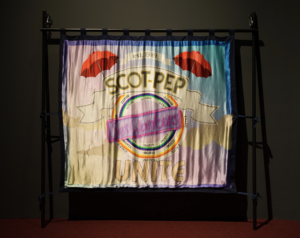-
1⃣️Workers a Conversation
 Without Us, Without Us, a film co-authored by Petra Bauer and sex worker-led organization SCOT-PEP follows the collective experiences of Scottish sex workers, their struggle for labor rights, and their work with (women) relationships as the center.
Without Us, Without Us, a film co-authored by Petra Bauer and sex worker-led organization SCOT-PEP follows the collective experiences of Scottish sex workers, their struggle for labor rights, and their work with (women) relationships as the center.
The entire interview brings together four members of the film production as they work on and make the film have different experiences. Reflections begin and end in conversations that provide insight into sex worker organizations and worker continuity.
In the interview, Petra Bauer understands which important areas of sex worker politics need to be addressed in the film, and how this can be addressed through the medium of film. What matters most to him is which issues are important to SCOT-PEP and how these are addressed in the film.
🎬The film develops a script, or series of lines, that calls for a particular argument in a particular context. This is a movie that can have a conversation. When spectators are invited as guests to join a group and a sport they would normally not be able to access for a short period. They are allowed to listen, but not overheard—as makers and sex workers control listening.
A film is a political act in itself, as it visually occupies the space of the STUC. Sex work is difficult to recognize as work, and there is no other perspective or more abstract, anti-work struggle for sex workers. However, there is no contradiction in wanting to give up rights when you are not recognized as a worker, while at the same time wanting to dismiss the work itself, it comes back to short-term and long-term goals. There are references to the Jeanne Dillman films, which address issues related to identity, women, and labor by very consciously combining content and aesthetics. The film is important to feminist discussions about the female condition and the potential of a feminist aesthetic.
-
2⃣️Introduction: An Otherwise Anthropology
Anthropologists often draw on phenomenological and continental theoretical genealogy in an attempt to speculate on possibilities beyond the existence of dystopias, reserved for opening a site for relationships or actions that do not quite fit liberal political understandings.
He poses the question: what kind of anthropology can contribute to this deep and enduring practice of world-building? Surveillance or voyeurism of colonial violence, institutionalized anthropologically, towards the possibility of conversion and the transformation in the process.
Attempts to construct other worlds within contemporary complexities, mentioned in the essay – restorative thinking, building relationships in fieldwork and institutional spaces. And mention epistemological tools and moral positions to build and conduct other anthropology. Thinking together requires co-authorship, as well as genre-diverse texts beyond published research manuscripts, and a range of radical theories mixed with grassroots relevance and exchanging tools for liberation.
-
3⃣️Introduction: An Otherwise Anthropology
Anthropologists often draw on phenomenological and continental theoretical genealogy in an attempt to speculate on possibilities beyond the existence of dystopias, reserved for opening a site for relationships or actions that do not quite fit liberal political understandings.
He poses the question: what kind of anthropology can contribute to this deep and enduring practice of world-building?
Surveillance or voyeurism of colonial violence, institutionalized anthropologically, towards the possibility of conversion and the transformation in the process. Attempts to construct other worlds within contemporary complexities, mentioned in the essay – restorative thinking, building relationships in fieldwork and institutional spaces. And mention epistemological tools and moral positions to build and conduct other anthropology. Thinking together requires co-authorship, as well as genre-diverse texts beyond published research manuscripts, and a range of radical theories mixed with grassroots relevance and exchanging tools for liberation.
There Is No Such Thing as Documentary: An Interview with Trinh T. Minh-Ha
Reorganization is an ethnographic film. Scenes showing the daily life of rural women. By separating sound from image, forgoing authoritative voice-overs, and a long-take observation style in favor of a detached montage aesthetic, Trinh upends traditional conventions in anthropological filmmaking. Trinh is guided by claims to identity, existence and authenticity, arguing that they are products of patriarchal and colonialist epistemologies. Insisting on the eviction of the illusory purity of inherited classes makes way for hybrids and in-betweens, breaking the dominant language to imagine other forms of relationship and expression. “Forgetting Vietnam” commemorates the death of Trinh’s father and the 40th anniversary of the end of the Vietnam War through landscape, history, folklore and popular songs. To show what is – “Reality is subtle.”Authenticity is often fetishized in contemporary art in a very uncritical way. Authenticity is always defined by the people who consume the so-called authenticity.
“Forgetting Vietnam” commemorates the death of Trinh’s father and the 40th anniversary of the end of the Vietnam War through landscape, history, folklore and popular songs. To show what is – “Reality is subtle.”Authenticity is often fetishized in contemporary art in a very uncritical way. Authenticity is always defined by the people who consume the so-called authenticity.
Surname Viet Given Name Nam What was considered typical Vietnamese in Vietnamese cinema turns out to be not so typical. One sees that the identity of this country is actually a variety and a composition—constantly being interpreted in the present. When Women, Indigenous, Other came out and was widely discussed among identity politics pundits, the authors understood that we needed to be more generous in effecting change. Even when we criticize, we should consider the circumstances that lead someone to adopt an opposing black and white identity, especially among people of color. But a strong commitment to how it overlaps and interweaves.
About distinguishing works: In “Forget Vietnam”, three video formats are used, and you can see how this country is fighting fiercely between low-tech and high-tech, and how it adapts to modernity while protecting ancient times in daily life The problem. However, as new technologies emerge, old and new technologies are deliberately made incompatible. Modernity advances by making every step a way of disabling and discarding older versions of the system, constantly forcing people to “upgrade” and thus spend forever.

